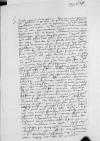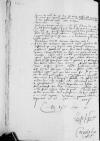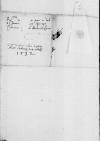Nolo apud te titulis agere. Heri sub noctem applicuimus huc, ⌊Godtscalcus⌋ et ego. Nam ⌊ille⌋ post mortem ⌊principis Ioannis⌋ sive sorte, sive maerore incidit in dysenteriam, qua tribus hebdomadis laboravit, immo amplius, et a qua superinscribed⌈a quaa qua superinscribed⌉, nisi Saxo Carolus fuisset, non evasisset. Veni autem rebus praeter exspectationem orig. expectationem⌈exspectationemexspectationem orig. expectationem⌉ bene gestis apud ⌊Ulmam⌋ et ⌊Augustam⌋, prout latius ⌊⌋, et cum ⌊Gabriele Martinengio⌋, apud quem uterque fuit gratiosus. Inveni autem apud dominum ⌊Fabianum⌋[2] ⌊⌋ tuas. ⌊⌋ non sine summa exspectatione orig. expectatione⌈exspectationeexspectatione orig. expectatione⌉ inveni, metuebam enim, ne quid tibi obvenisset.
Iam vero, quod ad res meas attinet, non opus est longa explicatione verborum. Eaedem enim sunt, quam prius, nisi quod, uti dixi, non omnino male sum insinuatus ⌊Hispanis⌋, qui rerum potiuntur, et forte non omnino male id meritus. Sane, si testimonia ⌊Germanorum⌋ pondus habent, possum videri ad tractandum cum iisdem non inidoneus.
Quod ad id attinet, quod serenissimis ⌊regibus tuis⌋ gratus advenisti, merito quidem id tuo accidit, sicut et quod in diminutionem damnorum per te sustentorum in te contulere.
Quod ad operam meam attinet, rescripsi sacrae ⌊reginali maiestati⌋ me quicquid possem impensurum, et id fiet, sed quod ad mercedem, tu nosti ingenium meum minime mercennarium neque electurum aut ⌊Foccharos⌋, aut ⌊Welzeros⌋, ideoque respondi nihil me tale petere, sed cf. Vulg. 1Sm 3:18:3 Quod bonum est in oculis suis, faciat ⌊faceret maiestas sua, quod bonum esset in oculis suiscf. Vulg. 1Sm 3:18:3 Quod bonum est in oculis suis, faciat ⌋. Neque vero nunc prolixus fui, quandoquidem cogor expensorum per me rationem reddere, dico expensorum in emendis bombardis, pulveribus, globis, hastis et tota supellectile Martia, quae non parvo constetit estque acta non in tenebris, sed in luce et coram rebus publicis, quamquam adhuc satis molestiarum sum exhausturus apud ⌊Hyspanos⌋, qui praefecti sunt rationibus, nihil minus, quam qualiter conveniat cum ⌊G written over H⌈HGG written over H⌉ermanis⌋, transigere intelligentes. Sed haec orig. hec⌈haechaec orig. hec⌉ Deo committenda sunt.
De ⌊Brandtnero⌋ nihil audivi interim. Militat ⌊ille⌋ ⌊Posonii⌋, quo ne umbrae quidem advenere ⌊Turcarum⌋, non written over inter(?)⌈inter(?) non non written over inter(?)⌉ sine sinistra fama apud hospitem suum ⌊Ratisbonae⌋.
⌊Iudaeorum⌋ negotium primum acriter cordi fuit ⌊caesari⌋, deinde, cum hi, qui capti erant ⌊Antuerpiae⌋, suc written over e⌈eucuc written over e⌉currissent in iis necessitatibus patriis inferioribus praestita orig. prestita⌈praestitapraestita orig. prestita⌉ aliquanta summa pecuniae, refrigere mihi videtur.
⌊Ioannes⌋ vero ille, quem nosti, Venetus ille Lapidarius,[3] cum ex ⌊Ratisbona⌋ abiisset ad ferenda certa testimonia rerum transactarum in arce ⌊Cogell⌋, numquam rediit neque rescripsit. Puto alicubi written over ii⌈iiii written over ii⌉ insidiis mercatorum circumventum interiisse.
Quod me illustribus dominis ⌊castellano Cracoviensi⌋ commendaris aliisque, gratissimum est. Quod vero recte valeat ⌊Niptzitz⌋ amicus noster communis, gratissimum.
 UB H 154, f. 102v
Est vir ⌊ille⌋ talis, de quo dici id ⌊poetae⌋ possit, sed tamen feliciore orig. foeliciore⌈feliciorefeliciore orig. foeliciore⌉ eventu, quem optarim perpetuum aut diu saltem duraturum esse: cf. Verg. A. 11.285-286 ⌊Si duo praeterea orig. preterea⌈praetereapraeterea orig. preterea⌉ tales Idaea orig. Idea⌈IdaeaIdaea orig. Idea⌉ tulisset terra viros etc.cf. Verg. A. 11.285-286 ⌋
UB H 154, f. 102v
Est vir ⌊ille⌋ talis, de quo dici id ⌊poetae⌋ possit, sed tamen feliciore orig. foeliciore⌈feliciorefeliciore orig. foeliciore⌉ eventu, quem optarim perpetuum aut diu saltem duraturum esse: cf. Verg. A. 11.285-286 ⌊Si duo praeterea orig. preterea⌈praetereapraeterea orig. preterea⌉ tales Idaea orig. Idea⌈IdaeaIdaea orig. Idea⌉ tulisset terra viros etc.cf. Verg. A. 11.285-286 ⌋
Quod ad ulteriora attinet, de domino ⌊Fabiano⌋ nunc nihil amplius scribere possum, quam quod dignus est quavis magna provincia, ita quod, quocumque extenderit ingenium, illic sit valiturus.
Quod ad res novas attinet, de ⌊Turcis⌋ magna et ingentia dicta sunt. Quae exitura in id videntur, quod dixit ⌊poeta⌋ quidam: cf. Hor. Ars 139 ⌊Parturiunt montes, nascetur ridiculus muscf. Hor. Ars 139 ⌋, nam ille Xerxeus apparatus apud ⌊Guncium⌋ et alibi dissolutus est neque impune tulere praedatores exercitam grassationem, dedere enim poenas, sicut latius intelligere potuisti. Interim ⌊timor ille written over i⌈iee written over i⌉ orbis⌋ aut fugit, aut, quocumque nomine voces, retrocessit. ⌊Caesar⌋ rebus omnibus optime comparatis, cum videat instante hieme orig. hyeme⌈hiemehieme orig. hyeme⌉ nihil posse magnum geri, videtur abiturus in ⌊Italiam⌋ commissa ⌊fratri⌋ summa rerum et exercitus. ⌊Qui⌋ a written over i(?)⌈i(?)aa written over i(?)⌉d expugnandam ⌊Budam⌋ videtur hinc abiturus. Omnes hi written over u⌈uii written over u⌉c adsunt: ⌊Itali⌋, ⌊Hispani⌋, ⌊Germani⌋, nostrates. Laboratur autem peste ⌊Viennae⌋. Hac nocte incidit in febrem calidam acutam ⌊Valdesius⌋ noster, apud quem hodie mane fui. De ⌊quo⌋ metuo. Det ⌊illi⌋ Deus, quod expedit.
In praesentiarum non possum ultra morari neque ad te copiosius scribere. Tu istam brevitatem consule boni et rectissime vale. Commendat se ex animo tibi dominus ⌊Godtscalcus⌋ noster. Comes ⌊Nogarolius⌋ cum ⌊Iosepho a Lambergk⌋ huc rediit. ⌊Lundensis⌋ abest in commissione ⌊caesaris⌋, nescio ad quos. Te vero, Pater ex animo venerande, Deus conservet. Et brevi copiosius. A me litteras exspecta orig. expecta⌈exspectaexspecta orig. expecta⌉.
 UB H 154, f. 102v
Est vir
UB H 154, f. 102v
Est vir 

